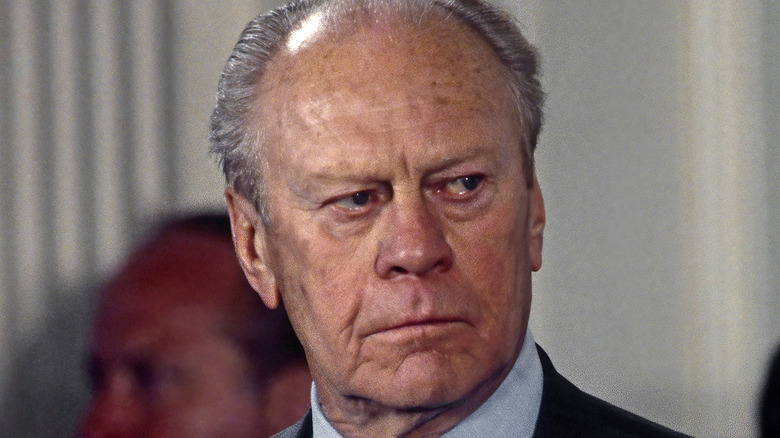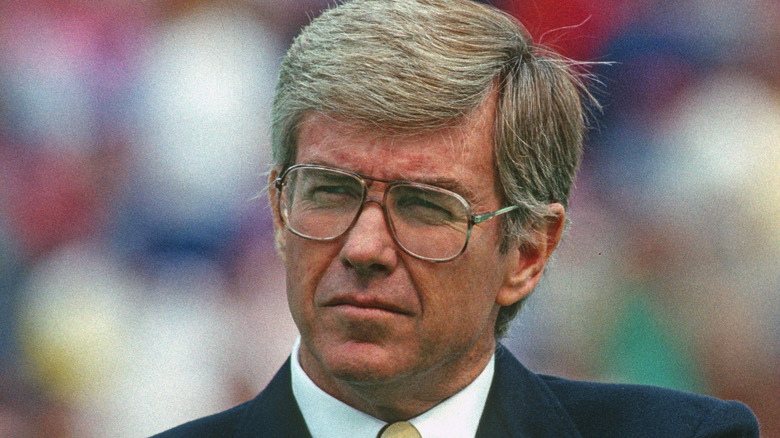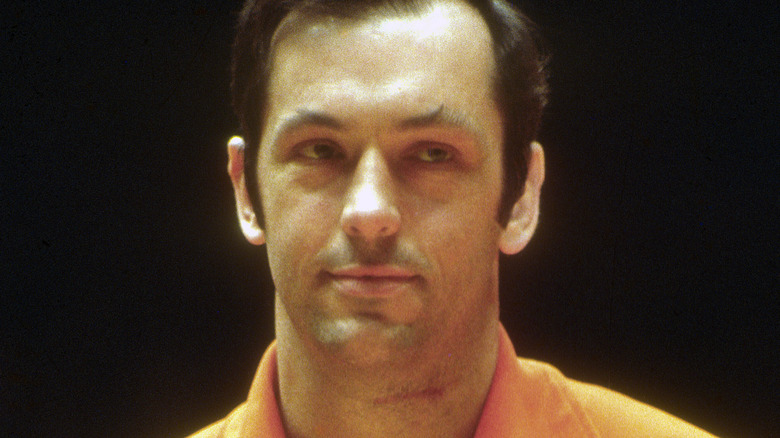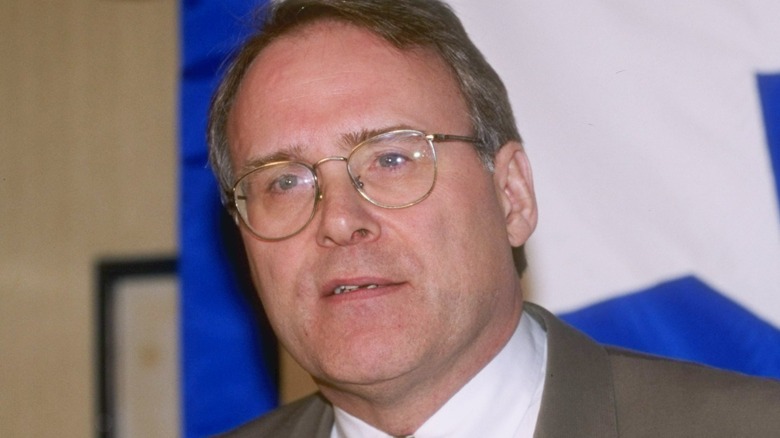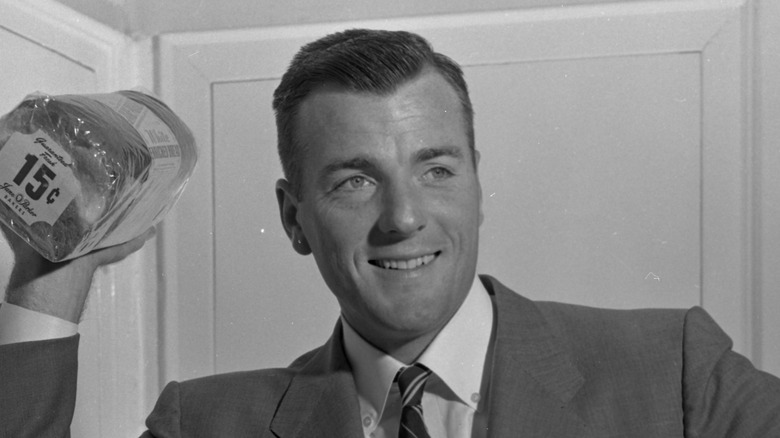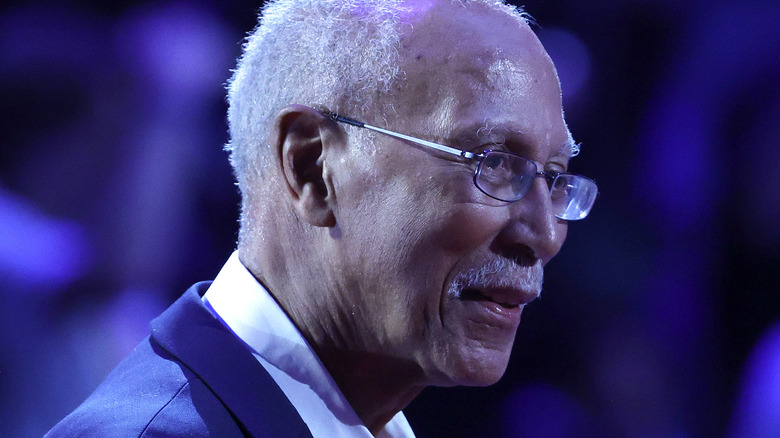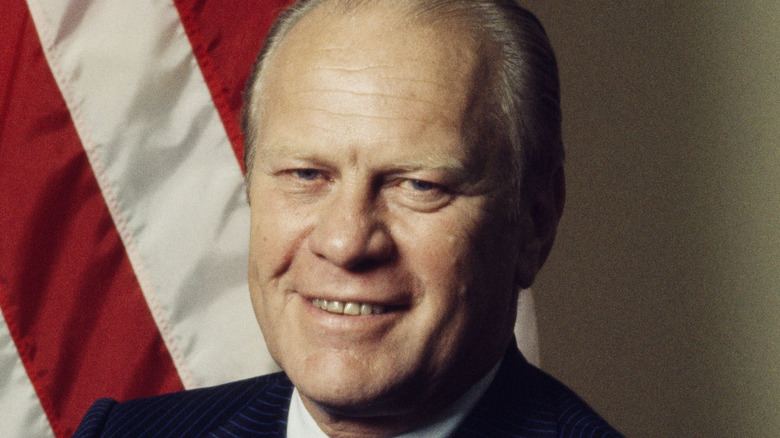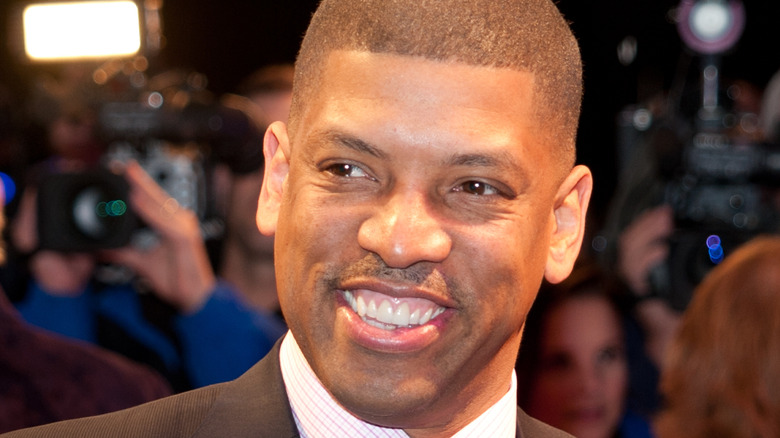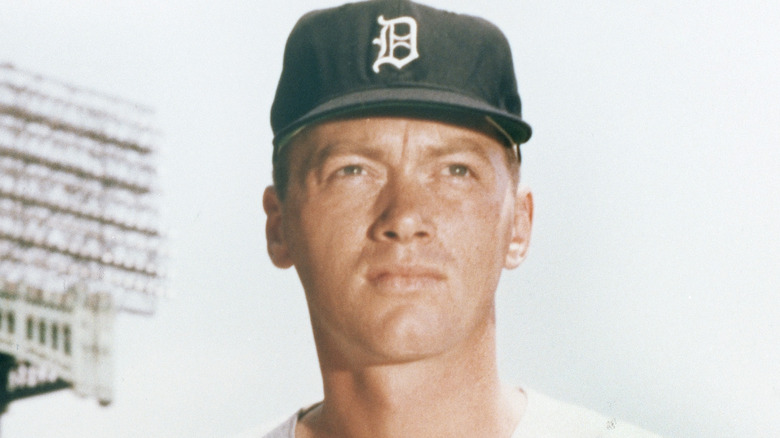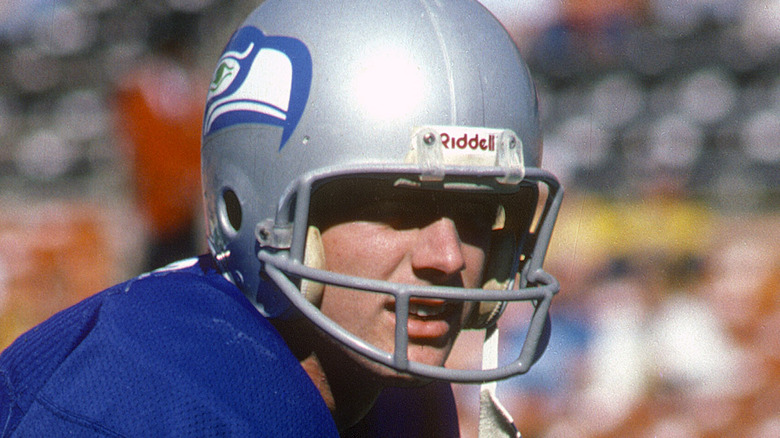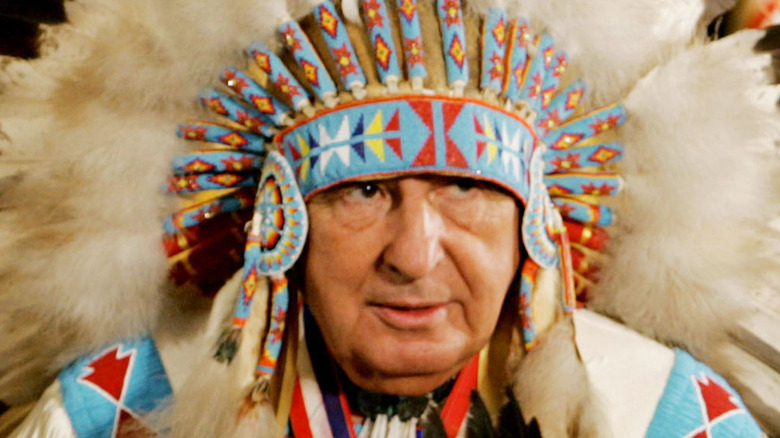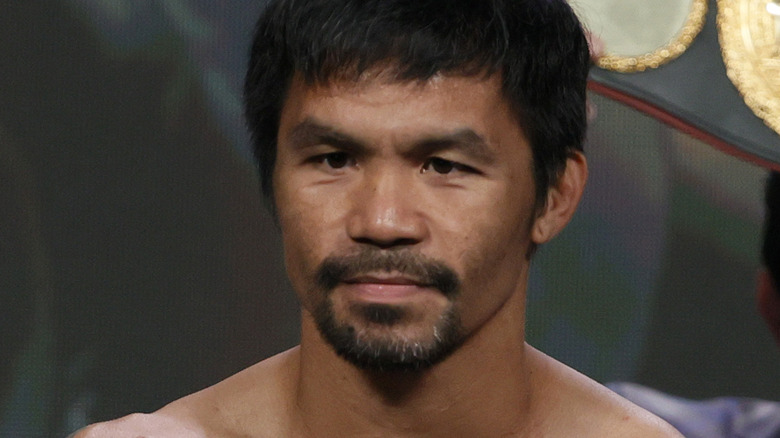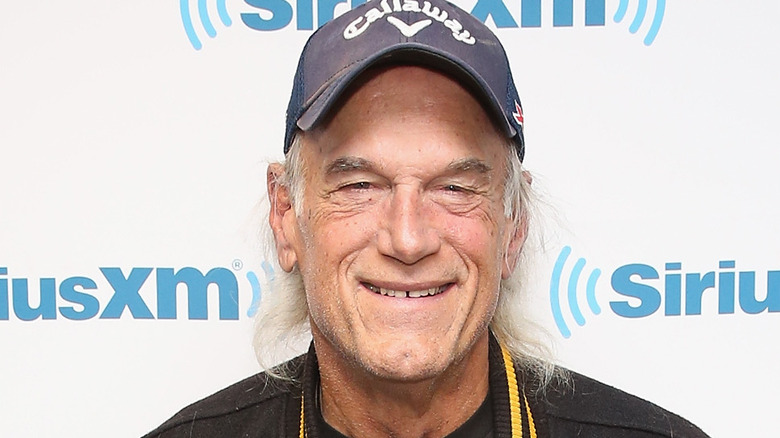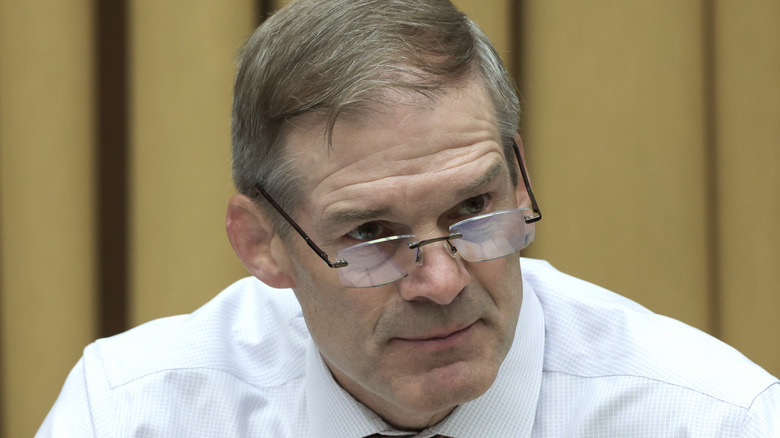Sports Stars Who Became Politicians
The highest levels of sports — collegiate, the Olympics, and professional leagues — are really not all that different from the world of politics. Both involve cheering crowds, a taste of fame, a requirement of leadership, and the nagging impulse to both compete hard and leave behind a legacy in the history books, having bent fate to one's will. The combat-like nature of sports can prove to be an ample preparation course for elected office, and it's also hard to walk away from the glories, spoils, and elevated position one gets from succeeding in athletics. It might make sense then that many accomplished athletes would choose politics, as opposed to the more mild-mannered fields of broadcasting, entertaining, or coaching, as their second act.
Here are some prominent individuals who became legends of the court, field, diamond, gridiron, or ice. They parlayed their fame, name recognition, goodwill, and likability into a place where they could wield real influence: elected office. These are major athletes who became powerful politicians.
Jack Kemp
Drafted out of Occidental College in 1957, according to The New York Times, quarterback Jack Kemp was cut by the Detroit Lions. However, after brief trial runs with other NFL teams and in the Canadian Football League, he found a spot at the head of the offense for the Los Angeles Chargers, who in 1960 were a founding franchise in the American Football League. Waived after a hand injury, the all-AFL Kemp landed with the Buffalo Bills and became a superstar in the upstart league, leading the team to league titles in 1964 and 1965, as well as a most valuable player award. He retired after his seventh all-star season in Buffalo, in 1969, and holds numerous pre-NFL merger AFL records, including most passes, completions, and passing yards.
Not long after leaving the gridiron for good in 1969, Kemp cashed in on his local celebrity status and won a 1970 election, to represent suburban Buffalo in the U.S. House of Representatives. His fervent advocacy of supply-side economics became a major philosophical lynchpin of the 20th- and 21st-century Republican platform, arguing that economic growth is spurred by tax cuts for top earners. Eschewing calls to run for the presidency, Kemp would ultimately serve as the secretary of housing and urban development in the administration of President George H.W. Bush. He would also be Bob Dole's running mate in the 1996 election, losing to incumbents President Bill Clinton and Vice President Al Gore.
Bill Bradley
Bill Bradley spent his entire 10-season NBA career with the New York Knicks, and it could've been longer, except that he spent two years in England after he was drafted in 1965 (#2 overall), having earnt the privilege of studying at Oxford University on a prestigious Rhodes Scholarship. A standout at Princeton University, Bradley was a three-time All-American and the Associated Press' Player of the Year in 1965, the year Bradley led his team to the Final Four, according to his Naismith Memorial Basketball Hall of Fame bio. Once he got to the professional leagues, the all-star's offensive prowess and on-court leadership won the Knicks NBA titles in 1970 and 1973.
In 1978, scarcely a year after retiring from basketball, Bradley was elected to the U.S. Senate, representing New Jersey until 1997, according to the Biographical Directory of the United States Congress. He moved into the private sector for the rest of the '90s, writing essays for CBS News, teaching at Stanford University and Notre Dame, and working as an advisor for the J.P. Morgan company. Bradley made one last but major move into politics in 2000, when he sought the Democratic nomination for president, dropping out early in the primaries when it became clear he couldn't defeat Vice President Al Gore, per The New York Times.
Ken Dryden
Of all the guys on the 100 Greatest NHL Players list issued by the National Hockey League in 2017, only 15 are goaltenders, and one of them is Ken Dryden. Over a relatively brief eight-season playing career in the 1970s, Dryden led the Montreal Canadiens to Stanley Cup victory six times, and won the Vezina Trophy (given to the year's most outstanding goalie) five times. He also pulled off a rare trick: In 1971, he was awarded the Conn Smythe Trophy for playoff MVP in 1971, after playing in just six regular season games, and a year later won the NHL's Calder Trophy for best rookie. As of 2022, Dryden ranks third on the NHL's all-time list for top save percentage.
According to Canada's Liberal Party, Dryden got a taste for politics and leadership while working as president of the NHL's Toronto Maple Leafs, and then during a term as the first youth commissioner for the province of Ontario. In 2004, Dryden won a seat in Canada's parliament, representing the York Centre riding in Toronto. Dryden won re-election two more times, but lost his spot in 2011, per CTV News, ending a political career that included a stint as the minister of social development in the cabinet of Prime Minister Paul Martin, and a run at the leadership of the Liberal Party.
Bob Mathias
Bob Mathias is one of the most accomplished American athletes of the 20th century, and he did it all as a nonprofessional — and in more than one sport, too. According to ESPN, in the 1948 Olympics he won the gold medal for the decathlon — a rigorous 10-event, multi-discipline competition — whose victory comes with the unofficial title of "World's Greatest Athlete" (per NPR). At just 17, he was the youngest winner in Olympic decathlon history, and after winning the gold again in 1952, the first to ever win consecutively. That year, Mathias also played for the Stanford University football team in the Rose Bowl, the only person to ever compete in a major bowl game and the Olympics in the same annum.
After being named the AP's Male Athlete of the Year (and eventual enshrinement in the U.S. Olympic Hall of Fame, as well as the National Track and Field Hall of Fame), Mathias graduated from Stanford, earned an officer rank in the Marines, acted in the TV series "Troubleshooters," and then got political. In 1966, he won his first election to the U.S. House of Representatives as a Republican representing California's District 18. Representative Mathias served four terms, until he was voted out in 1974.
Dave Bing
Dave Bing is officially regarded as one of the NBA's all-time best, named to the league's 75th Anniversary Team in 2021. The seven-time all-star for the Detroit Pistons and Washington Bullets averaged more than 20 points and six rebounds over his career, which began with a Rookie of the Year season, followed by a scoring title. The Naismith Memorial Basketball Hall of Fame inductee appeared on two all-NBA teams, won an All-Star Game MVP, and was one of the first honorees of the J. Walter Kennedy Citizenship Award, which recognizes players with a commitment to community service.
After rounding out his career in the late '70s with short stints with the Washington Bullets and Boston Celtics, Bing returned to the city where he'd spent the bulk of his NBA years: Detroit. In the booming industrial city, Bing formed The Bing Group, a steel processing and metal forming company, according to the Encyclopedia of Detroit. Both a legendary athletic figure and local business leader, Bing opted to run for mayor of Detroit in 2008, outpolling interim replacement Kenneth Cockrel Jr. (serving in place of the resigned, federally convicted Kwame Kilpatrick). Bing won a full term of his own in 2009, but didn't seek another stint in 2013, after Detroit filed for bankruptcy — when many of his duties and powers were stripped, and given to emergency financial manager Kevyn Orr.
Gerald Ford
In the early 20th century, when college football was more rough-and-tumble, better regarded, and more popular than its professional counterpart (per NBC Sports), collegiate gridiron greats could become superstars without ever playing in the NFL. That was the trajectory for Gerald Ford, who, according to the NCAA, led the University of Michigan to back-to-back national championships in 1932 and 1933. Ford entertained offers to go pro from both the Detroit Lions and the Green Bay Packers, but he passed up the chance to instead study law at Yale, where he was also on the faculty as a coach for the boxing and freshman football squads.
After forming a law practice in Michigan and enlisting in the Navy to fight in World War II, according to The New York Times, Ford won a seat in the U.S. House of Representatives in 1948, and worked his way up to the House's minority leader by the mid-1960s. In 1973, after Vice President Spiro Agnew resigned following a no-contest plea on a charge of tax evasion, President Richard Nixon offered Ford the number-two job. He took it, and when Nixon similarly resigned in 1974, after the Watergate scandal, Ford ascended to the presidency of the United States — the first and only person to hold the executive office without being elected to it. He lost his bid for re-election in 1976, to Democratic challenger Jimmy Carter.
Kevin Johnson
In the NBA of the early 1990s, high-scoring, playmaking guards dominated the league, including the likes of superstars Michael Jordan, Isiah Thomas, and Clyde Drexler: Right up there with them was Kevin Johnson. Spending 12 seasons with the Phoenix Suns, the relatively short 6'1" Johnson was a three-time all-star who averaged more than 20 points a game in five seasons, and more than 10 assists per game in four seasons. In 1993, Johnson's Suns made it all the way to the NBA Finals.
Born and raised in Sacramento, California, per ABC10, Johnson kept ties to his hometown during his NBA career, establishing a local after-school program called St. HOPE, and ultimately returning to the city in 2008 to run for mayor. He unseated incumbent Heather Fargo to become the first Black mayor in the history of the California capital city. After setting up youth, social, and unhoused programs, Johnson easily won re-election to a second — and final — term, and he personally ensured that the NBA's Sacramento Kings didn't make good on a promise to move to Seattle.
Jim Bunning
One of the most consistent and enduring pitchers to ever take the mound in Major League Baseball, sidearm-throwing pitcher Jim Bunning played for 17 seasons (1955 to 1971), including an 11-year period where he didn't miss a single scheduled game, according to his Baseball Hall of Fame profile. With nine all-star appearances and 224 wins, Bunning tossed a rare no-hitter in 1958, but mainly pitched to strike out batters. Bunning led the league in strikeouts three times and finished his career with 2,855 KOs, which at the time of his retirement was the second-highest count ever.
According to Politico, Bunning wanted to become a Major League Baseball manager, but he didn't get the call and so he became a sports agent. In 1977, he reluctantly agreed to run for a city council position in Fort Thomas, in his home state of Kentucky, and won the seat. Over the next decade, he'd be elected to the state Senate, make a failed run for the governorship, and make it to the U.S. House of Representatives as a Republican representing Kentucky's 4th District. In 1998, he'd move over to the U.S. Senate, edging out another athlete, former University of Kentucky baseball standout Scott Baesler. After repeated clashes with GOP leaders during the last few years of his Senate career, Bunning decided against running for a third term in 2010.
Steve Largent
Like most expansion teams early in their existence, the Seattle Seahawks were mediocre to bad in their first decade of existence. The brightest spots in the team's 1970s and 1980s years were a few early-exit playoff runs, and they got there thanks to the team's first superstar, and eventual Pro Football Hall of Fame inductee, wide receiver Steve Largent. Slight and unassuming at 5'11" and 187 pounds, Largent was a star at the medium-sized University of Tulsa, before being drafted in the fourth round of the 1976 NFL draft, and then traded to the brand-new Seahawks where, in his rookie year, he finished third in the conference in receptions. He topped 70 receptions in six seasons, led the league in pass receiving yardage for a six-year period, was named to seven All-Pro teams, and when he retired in 1989, he had set records for receptions, consecutive games with a reception, and most touchdowns on receptions.
When Representative Jim Inhofe of Oklahoma resigned his seat in the U.S. House of Representatives, to run for the Senate in 1993, Oklahoma's governor appointed state-native Largent to the post, which he then won outright in 1994, according to the Biographical Director of the United States Congress. Largent held the post until he himself resigned in search of higher office, but failed to win his 2002 Oklahoma gubernatorial campaign.
Ben Nighthorse Campbell
The Japanese martial art of judo debuted as an official event in the 1964 Summer Olympics, held in Tokyo. By that time, American judoka Ben Nighthorse Campbell had already extensively trained and competed in high school, college, the Air Force, and at Japan's Meiji University, according to The Olympians. Campbell won the U.S. national judo championships in 1961, 1962, and 1963, according to the U.S. Judo Federation, and he took home a gold medal at the 1963 Pan-American Games. He made the 1964 American Olympic team, but an injury he suffered left him out of medal contention.
After purchasing a Colorado ranch in the late 1970s, Campbell was elected several years later to the state House of Representatives, for a four-year term, before moving to the U.S. Capitol in 1987. With a Northern Cheyenne heritage, Campbell was among the first Native Americans to serve in both the U.S. House of Representatives and the U.S. Senate, per the Encyclopedia of World Biography. Campbell was a member of the former chamber from 1987 to 1993, and the latter from 1993 to 2005, during which time he changed his party affiliation from Democratic to Republican, according to the Grand Junction Daily Sentinel.
Manny Pacquiao
Filipino fighter Manny Pacquiao, colloquially referred to as "PacMan," has the talent and titles to rank among any list of all-time greatest boxers, according to Reuters. Pacquiao took home a total of 12 different titles in eight different divisions (per Inquirer), attaining and maintaining these positions of stature across four decades. According to BoxRec, Pacquiao amassed a career record of 62 wins (with 39 knockouts), eight losses, and two draws.
After nearly three decades in the ring, Pacquiao retired from the sport in 2021, to focus on taking his political career to the next level, according to Al Jazeera. Running as a staunchly conservative, tough-on-drug-crime platform, Pacquiao won a seat representing part of the Sarangani province in the Philippines' lower congressional chamber in 2010, serving concurrently with his boxing career. He was then elected to a six-year Senate term in 2016, with intentions to not only stand for re-election in 2022, but to also run for president of the Philippines.
Jesse Ventura
The 1980s were a boom period for the WWE — or as it was known at the time, the WWF — thanks to colorful, TV-friendly wrestling characters like Hulk Hogan, Andre the Giant, Roddy "Rowdy" Piper, and Jesse "The Body" Ventura. Known for elaborate, eye-popping theatrical costumes worn both in the ring as a wrestler, and as a commentator on various WWF broadcasts and events, Ventura squared off against superstars as a solo grappler, but truly made a name for himself as part of the East-West Connection — a tag team with Adrian Adonis.
After calling matches for the then-WWF until 1990, Ventura moved into politics, immediately winning an election the next year for the mayor of Brooklyn Park, Minnesota (per the National Governors Association), which he held for four years. That put him into position to win a three-way race for the Minnesota governor seat in 1998, defeating far-more connected political figures like St. Paul mayor Norm Coleman, and the dynastic Hubert H. Humphrey III. According to The Washington Post, Ventura became the first person from the Reform Party to win a gubernatorial race, as well as the first governor to have had his likeness rendered in an action figure (during his wrestling days).
Jim Jordan
The National Wrestling Hall of Fame recognizes amateur, collegiate, and Olympic grapplers who adhere more to the traditional rules and structure of the sport, as opposed to the flashy form presented by the WWE — Jim Jordan is an inductee into that organization. In the late 1970s and early 1980s, Jordan was a four-time wrestling champion in the state of Ohio, where for Graham High School he racked up a 150 and 1 record. Moving up to college wrestling for the University of Wisconsin, Jordan was a three-time All-American and won national titles in his junior and senior year. In his 1985 championship match, he beat Oklahoma State's John Smith, who would go on to win an Olympic medal. Jordan did not follow the same path to the Olympics, choosing instead to focus on getting a degree in economics — but would still attain a 156-28-1 record.
A self-described fiscal, anti-tax conservative, Jordan won election to the Ohio state General Assembly in 1994, a seat in the Ohio state Senate in 2000, and a spot in the U.S. House of Representatives in 2007.
